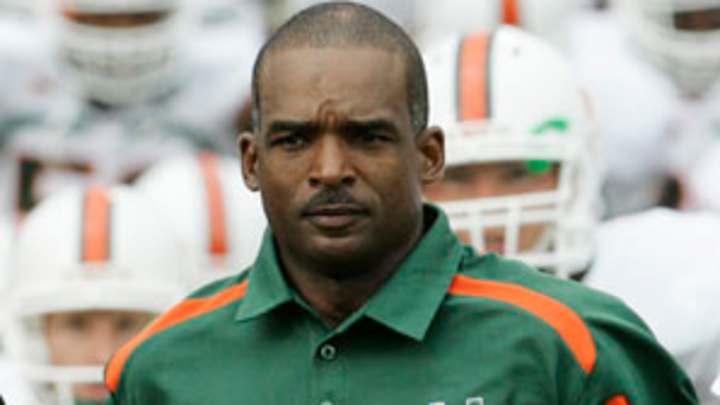Miami coach Randy Shannon brings real life experience to Hurricanes


He might be the most amazing story in sports. At 3, his father was murdered. He'd sit by the front door weeks after the funeral, waiting for the man who never would return to his life. His only memory is of their eating Lay's potato chips together.
Out of that came an appreciation for the pain of sons without fathers, as well as Rule No. 2 in the behavior contract each University of Miami players sign before the season: no guns.
If you're found with a gun, you're off the team, the contract states. No excuses. No exceptions. No waiting for some trial to conclude months later.
"I'll just say, 'Here's your papers,'" Miami coach Randy Shannon says.
That was the start of how all the moments he kept bottled inside for years came to define his coaching.
At 10, his older, twin brothers became addicted to crack cocaine. They'd shoo him away when he told them to stop. "Who do you think you are, our dad?" they'd say, and laugh, as they did all the way to their graves of AIDS, joining their sister who already had died of that epidemic that raged on their side of the street.
Out of that came an understanding of shadows cast inside families. Shannon has recruited players in houses where drugs sit on the table between them and another who ran the family numbers business. He helped a player, Antonio Dixon, graduate last year after a youth of being passed around the neighborhood while his mom was in and out of rehab.
He counseled another player who was told, at 20, the man he always thought was his father wasn't and then met the stranger who was. He's talked another player weighed down by family issues back into school. He's helped a player in the pros who was bankrupted by his family. On the stories go. And on.
"I say, 'Don't get frustrated and flustered. Don't think the world's coming to an end. Don't quit on yourself. I know how you feel -- I've been there,''' he says.
At 16, he became a father. He was scared. He thought the life he dreamt about was gone. He can still summon that fear in his big office today, even with his daughter all grown and strong and a veteran of the Iraq war.
Out of that came a compassion for kids with kids. He has a player who was kicked out of his home in high school for fathering a child. He has others balancing school and football and families. Last week, when fullback Pat Hill was distraught, his girlfriend working, his baby needing care, Shannon offered a solution.
"Bring your baby to the meetings,'' he said. That's why a toddler played on the floor while Miami's offense plotted a win against Georgia Tech.
At 17, something else came, something foreign. The Dade County schools offered etiquette lessons. Don't laugh. He learned how to hold open a door for someone, how to pull out a chair and sit down, how to eat with a salad fork and soup spoon, even how to waltz.
Out of that came a porthole into another, bigger world, the one where all these years later he now walks comfortably. Chamber of Commerce breakfasts. Booster-club dinners. University fund-raisers.
"I can go into any world, talk to anyone at all,'' says Shannon, now 43.
Shannon stands behind his wide desk, with its picture window looking out to the practice field, under a framed black-and-white photo. It's from the 1950s. A black man walks outside a stadium in a dark suit and long, dress coat.
None of Shannon's players recognize the man. Nor have they heard of the name on the stadium: Ebbetts Field. Of late, Shannon has been pointing to him to address a current pet peeve: players with low-riding pants.
"Look how the man presents himself,'' he'll say.
The players look.
"You don't know if he's a player or a businessman,'' he'll say.
Then he'll them tell about Jackie Robinson. He's studied up. He's even watched the 1950 movie, The Jackie RobinsonStory, the one where Robinson plays himself.
"They listen,'' he says when asked if his players understand.
These last couple of weeks, as Miami has defeated Florida State and Georgia Tech and prepares for a huge game at Virginia Tech on Saturday, the talk is how Miami has shown the kind of big plays and big-name players that you haven't seen from it in several sputtering seasons. But look closer to realize what you haven't seen.
Do you know how many Miami players have been arrested in the two-and-a-half years since Shannon was named coach?
One. That was Robert Marve, the former quarterback, for breaking a side mirror on a car.
Do you know how many senior players are on course to graduate?
All of them, Shannon says.
Do you know how many black coaches off America's meanest streets walk the sideline of big-time college football in these enlightened times of 2009?
The one in this office.
Maybe Shannon isn't the most amazing story in sports right now. But go ahead, name someone else.
